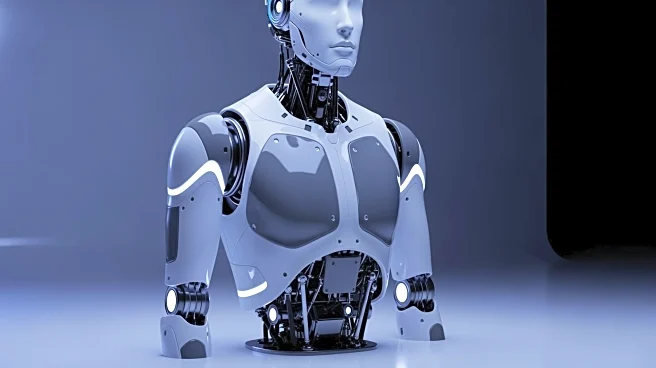What's Happening?
UBTECH has initiated mass production of its Walker S2 humanoid robots, marking a significant milestone in the company's efforts to deliver 500 units within the year. This development follows substantial
orders totaling $112 million and a data center contract worth $22 million. The Walker S2 robots are set to be deployed across various industrial applications, including automotive manufacturing, smart factories, and data collection centers. UBTECH aims to ramp up production to 5,000 units annually by 2026 and 10,000 units by 2027. The company is leveraging its proprietary BrainNet technology platform to enhance usability and support innovative applications in manufacturing environments.
Why It's Important?
The mass production of humanoid robots by UBTECH represents a significant advancement in the robotics industry, potentially transforming industrial operations. By integrating these robots into sectors like automotive manufacturing and logistics, UBTECH is setting a benchmark for large-scale deployment of humanoid robotics. This move could lead to increased efficiency and reduced labor costs in these industries. The company's strategic partnerships with major players such as BYD and Foxconn further underscore the growing demand and recognition of humanoid robots' capabilities. As UBTECH continues to refine its technology and expand its production capacity, it is poised to play a pivotal role in the future of industrial automation.
What's Next?
UBTECH plans to continue scaling its production capabilities, aiming for an annual output of 5,000 robots by 2026 and 10,000 by 2027. The company is focused on enhancing its delivery approach by providing full operational capabilities rather than just products. This includes a standardized turnkey solution that enables rapid scenario deployment and supports innovative applications across manufacturing environments. As UBTECH collaborates with industry leaders, it is expected to further refine its technology and delivery models, driving continuous technological evolution and expanding the adoption of humanoid robotics.
Beyond the Headlines
The deployment of humanoid robots raises ethical and cultural considerations, particularly regarding the displacement of human workers and the integration of robots into everyday life. As UBTECH advances its technology, it must address these concerns and ensure that its robots complement human labor rather than replace it. Additionally, the widespread adoption of humanoid robots could lead to long-term shifts in industrial practices, necessitating new regulatory frameworks and workforce training programs.










